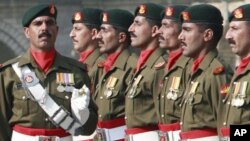In Pakistan officials confirm a senior officer serving in the country’s army headquarters is under detention for suspected ties to a banned religious extremist group.
Pakistani military officials say a brigadier general is being questioned about his ties to the banned group Hizb-ut-Tahrir and an investigation into his activities is ongoing.
Pakistani military spokesman Major General Athar Abbas confirmed the detention of General Ali Khan. General Abbas said it would be a mistake to link this detention with extremist groups like al-Qaida or the Taleban.
Hizb-ut-tahrir has officially denounced violence, but is still considered extremist for its fundamentalist views that call for a return to a pan-Islamic Caliphate under Islamic law.
While banned in Pakistan, the organization operates openly in many countries in the West, including the United States, where free speech laws protect them.
The Pakistani military spokesman made a point of separating this investigation from recent allegations that other Pakistani officials have been detained as part of the fallout from the May 2nd raid that killed Osama bin Laden in Abbottabad.
General Ali Khan has been in military detention since a few days after that raid, according to his family.
Many critics, internationally and in Pakistan, say the Pakistani military is deeply infiltrated by extremist groups, making suspect its loyalty in the international effort against terrorism.
But former Pakistani general and analyst Talat Masood says following the bin Laden raid, the Pakistani military is more interested in public perception than in actually purging itself of extremist sympathizers.
"The military leadership and the intelligence leadership seems to be more concerned about their image [then] they should not be because the best of preserving your image is by trying to confront the weaknesses, if there are any as soon as possible, rather than trying to cover them up through so-called image building," says Masood. "You cannot build your image without the reality. So I think that is a very important aspect. And I think we are making a huge mistake if we are trying to cover our weakness rather than confront."
Pakistani military officials insist they are doing what they can to combat militancy, but are often reluctant to admit there is a problem internally, preferring to point to military operations along the border with Afghanistan.




